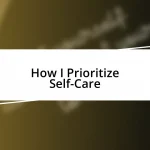Key takeaways:
- Mental health maintenance requires consistent attention, including coping strategies like mindfulness and journaling.
- Establishing daily routines promotes structure, stability, and self-care, enhancing overall mental well-being.
- Building a support network and seeking professional help can significantly improve one’s mental health journey.
- Practicing mindfulness and self-care, along with tracking emotional progress, empowers individuals to better manage their mental health.
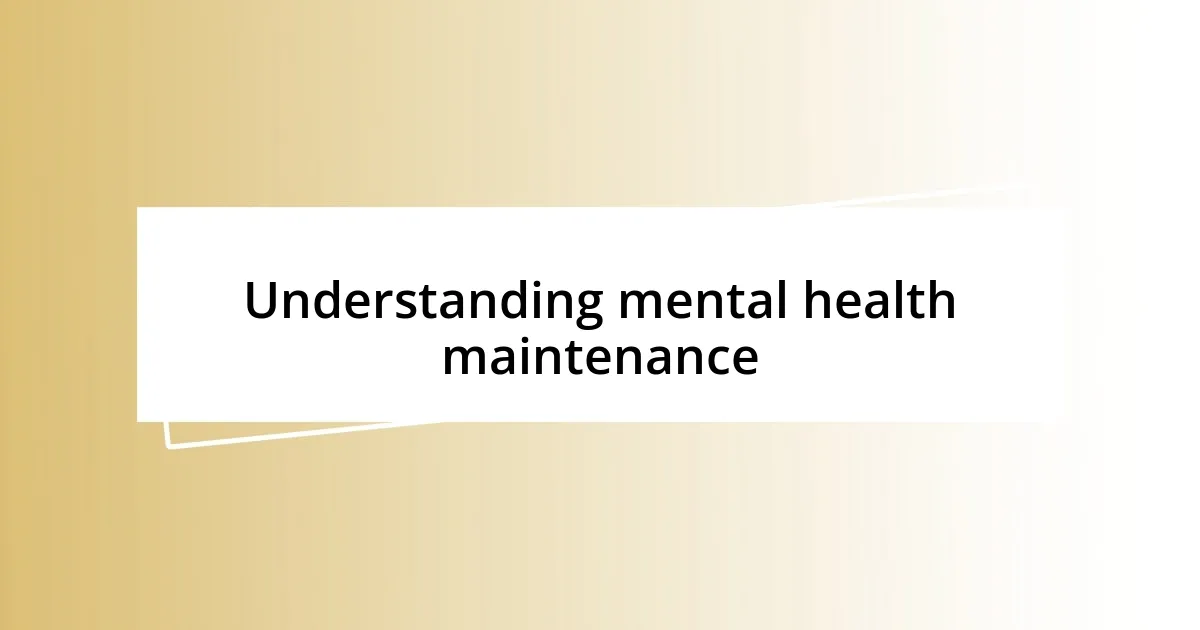
Understanding mental health maintenance
Mental health maintenance is all about actively nurturing our emotional well-being, much like how we take care of our physical health. I remember a time when I neglected my mental health amidst a busy schedule, thinking it would take care of itself. Looking back, I realize that was a misconception; mental health requires consistent attention and care.
One of the key aspects of maintaining mental health is developing coping strategies that work for you. Have you ever felt overwhelmed by stress? I’ve been there, and finding grounding techniques, like mindfulness or journaling, transformed my approach to tough days. Those moments of reflection not only helped me understand my emotions but also empowered me to manage them effectively.
Moreover, building a support system is crucial in this journey. For me, having friends who understand my mental health struggles has been life-changing. It’s comforting to know that I can share my experiences without judgment, reminding me that I’m not alone in this. So, how often do you connect with your support network? Regular check-ins can provide the encouragement we all need to keep our mental health in check.
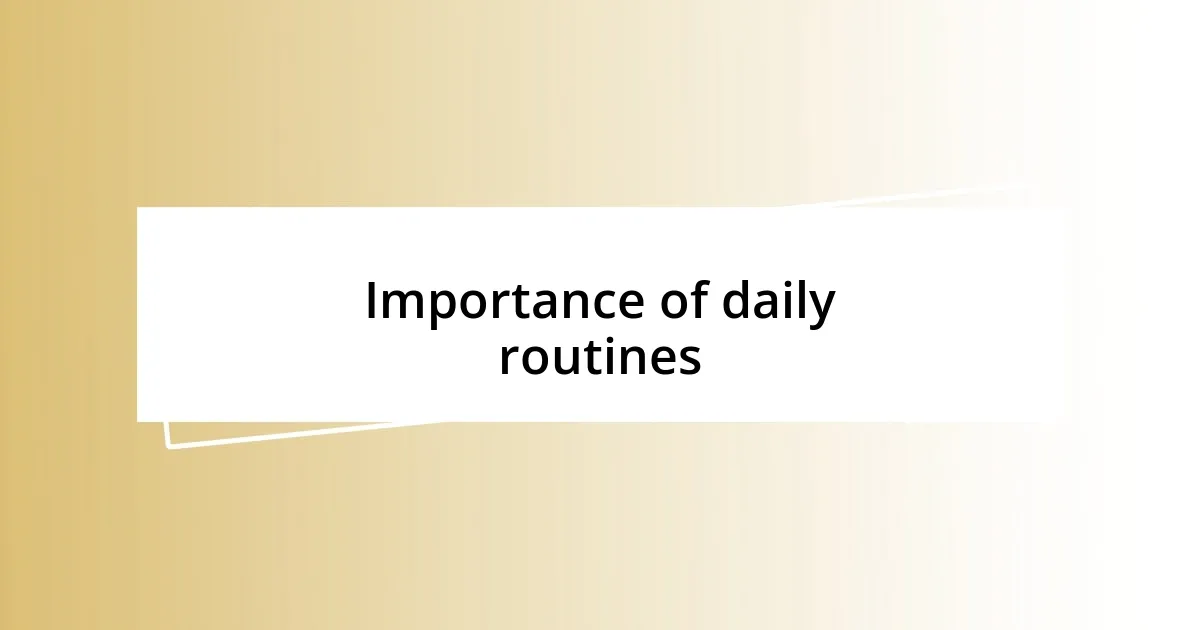
Importance of daily routines
Establishing daily routines has been a game-changer for my mental health. I’ve noticed that when I stick to a regular schedule, I feel more grounded and focused. There’s something incredibly comforting about knowing what to expect each day, which helps reduce anxiety and keep my mind clear.
Some benefits of daily routines include:
- Structure: They provide a framework for the day, making tasks more manageable.
- Stability: A routine fosters a sense of control, especially during chaotic times.
- Self-care: Scheduled time for activities like exercise or quiet reflection promotes mental well-being.
- Productivity: Having set times for tasks boosts efficiency and reduces procrastination.
- Healthy habits: Routines help in developing consistent positive habits, reinforcing a sense of accomplishment.
I vividly remember days when I’d jump from one unstructured activity to another, only to end up feeling scattered and stressed. By creating a morning routine that includes some light stretching and meditation, I transformed my start to the day. This simple change not only elevated my mood but also set a positive tone for what’s to come, allowing me to approach challenges with a clearer mindset.
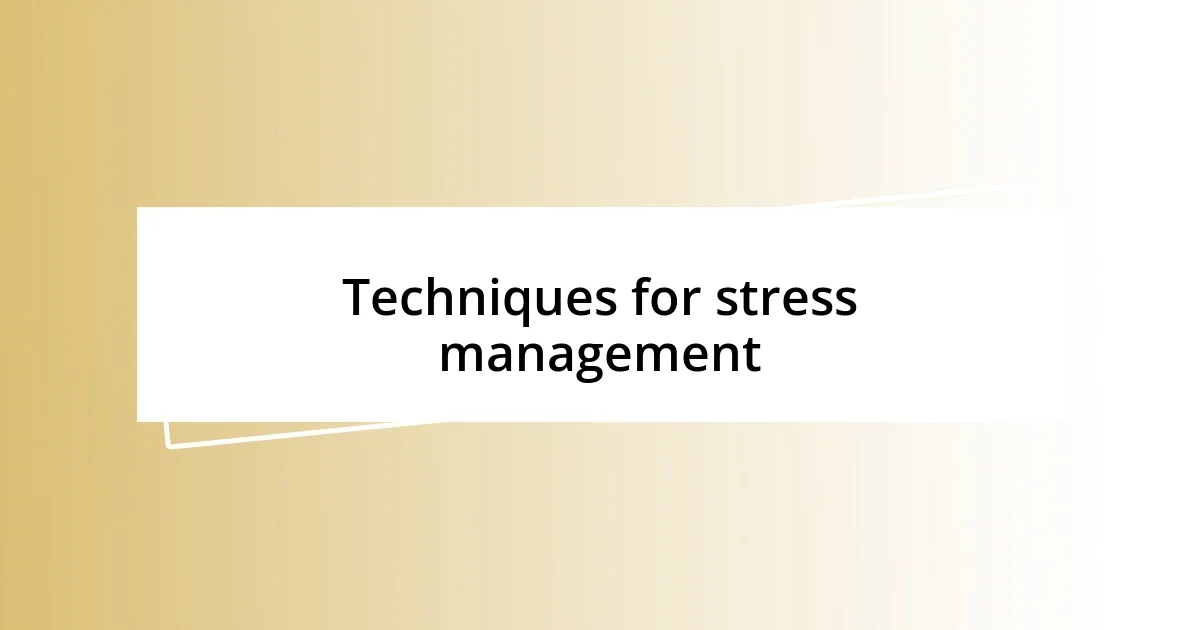
Techniques for stress management
Stress management techniques are essential for maintaining mental clarity and emotional balance. One powerful approach I’ve found beneficial is practicing deep breathing exercises. Just last week, I felt the weight of a stressful week at work, and in a moment of overwhelm, I focused on my breath. Taking a few slow, deep breaths not only calmed my racing mind but also helped restore a sense of control. It’s fascinating how something so simple can have a profound impact on our overall feelings.
Another technique that resonates with me is physical activity. I recall several times when a quick jog in the park completely shifted my mood. The rush of endorphins combined with the fresh air can act as a mental reset, making the chaos of daily life seem much more manageable. I often remind myself, especially on days when I’m not feeling my best, that even a short walk can do wonders for my mental state.
Lastly, I’ve embraced mindfulness meditation as a crucial part of my stress management toolkit. Whenever I sit down for a few minutes of focused meditation, I witness a remarkable transformation in my mindset. It’s as if I’m peeling away layers of stress to uncover a calmer core—like finding peace amidst the noise. So, what’s your go-to technique for handling stress? I encourage you to explore the methods that resonate with you, because ultimately, understanding what works can pave the way to a more resilient mindset.
| Technique | Description |
|---|---|
| Deep Breathing | Helps calm the nervous system and reduce feelings of stress quickly. |
| Physical Activity | Boosts endorphins, improving mood and providing a mental reset. |
| Mindfulness Meditation | Encourages relaxation and present-moment awareness, fostering inner peace. |
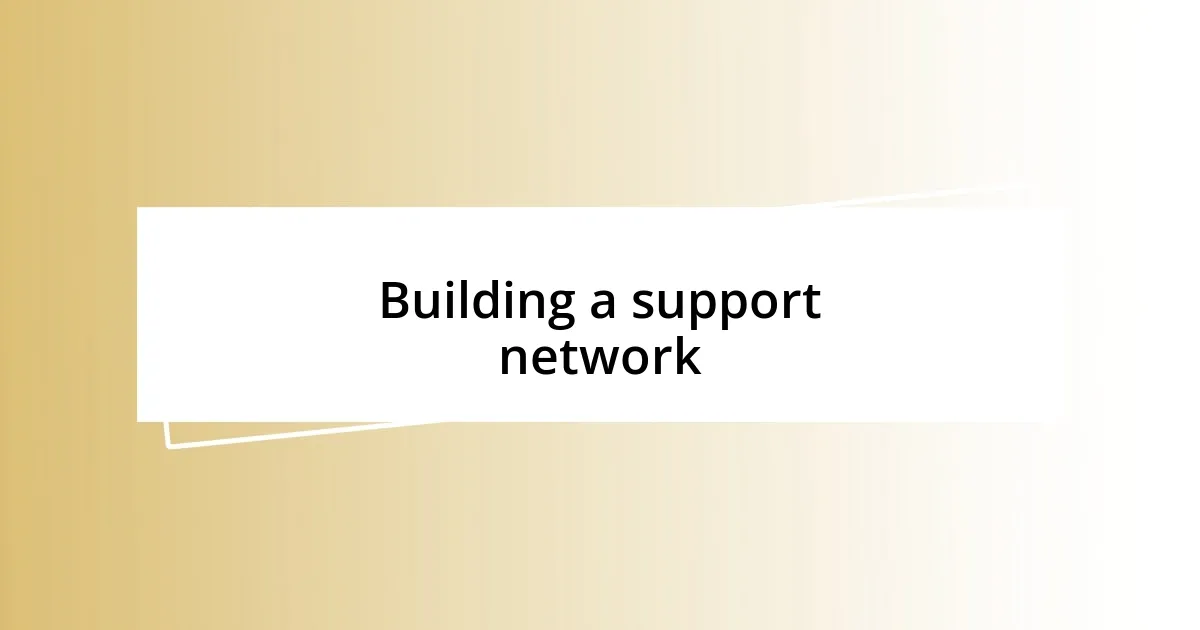
Building a support network
Building a support network can profoundly influence our mental health journey. I often reflect on the times when I felt isolated; it was during those moments that I realized just how vital connections are. Whether it’s friends, family, or even colleagues, having people to talk to makes a world of difference. Have you ever felt like just sharing your thoughts with someone lightened your burdens? I know I have.
One telling experience for me was when I reached out to an old friend during a particularly tough season in my life. I remember expressing my fears and frustrations while feeling vulnerable, yet, to my surprise, our conversation created an instant bond. It made me feel seen and heard, reinforcing the idea that sharing struggles in a safe environment can lead to healing. This experience spoke volumes about the importance of nurturing relationships that prioritize open dialogue and support.
It’s also essential to consider the diverse perspectives people bring to the table. I’ve learned that every person in my network offers a unique viewpoint, which becomes invaluable during difficult times. I think about the supportive co-worker who always shares motivational quotes in our group chat; those small gestures can uplift and inspire me when I least expect it. Surrounding ourselves with individuals who challenge us, encourage us, or simply empathize with us enhances our resilience and mental well-being. Isn’t that what we all seek—a sense of belonging and understanding?
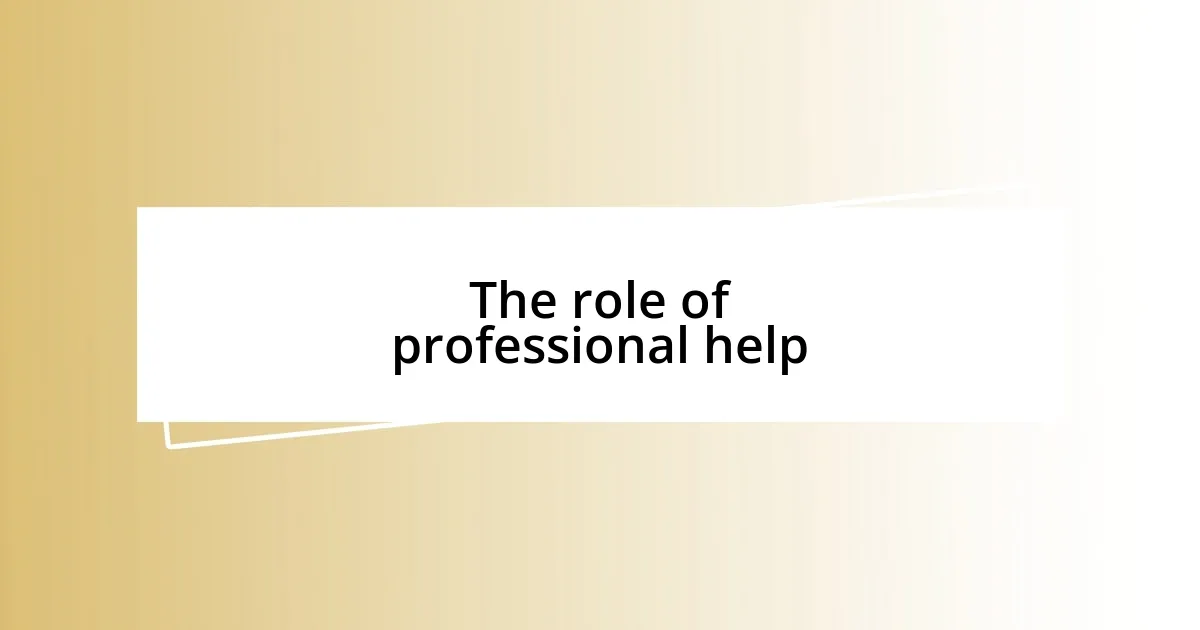
The role of professional help
Professional help plays a crucial role in mental health maintenance. I still remember the first time I consulted a therapist. It was like unleashing a flood of thoughts that had been trapped inside me for far too long. The professional guidance not only provided insight into my feelings but also equipped me with tools to navigate them effectively. Have you ever felt that a fresh perspective could open up new paths in your mental journey?
I often find that the structured environment of therapy encourages vulnerability, promoting deeper understanding. For instance, during one session, my therapist introduced cognitive-behavioral techniques to help reframe negative thoughts. The shift was empowering, helping me recognize automated thought patterns that I hadn’t noticed before. This experience made it clear to me that professional support can illuminate the shadows of our minds, leading to personal discovery and growth.
Additionally, medication can also play a significant role when appropriate, providing the chemical balance that some of us need to feel more like ourselves. In my case, exploring medication improved my overall well-being, enabling me to engage more fully in life. However, this process should always be approached collaboratively with a healthcare professional. It raises the question: how do we best discern when to seek this kind of help? From my perspective, listening closely to our own mental state is the key.
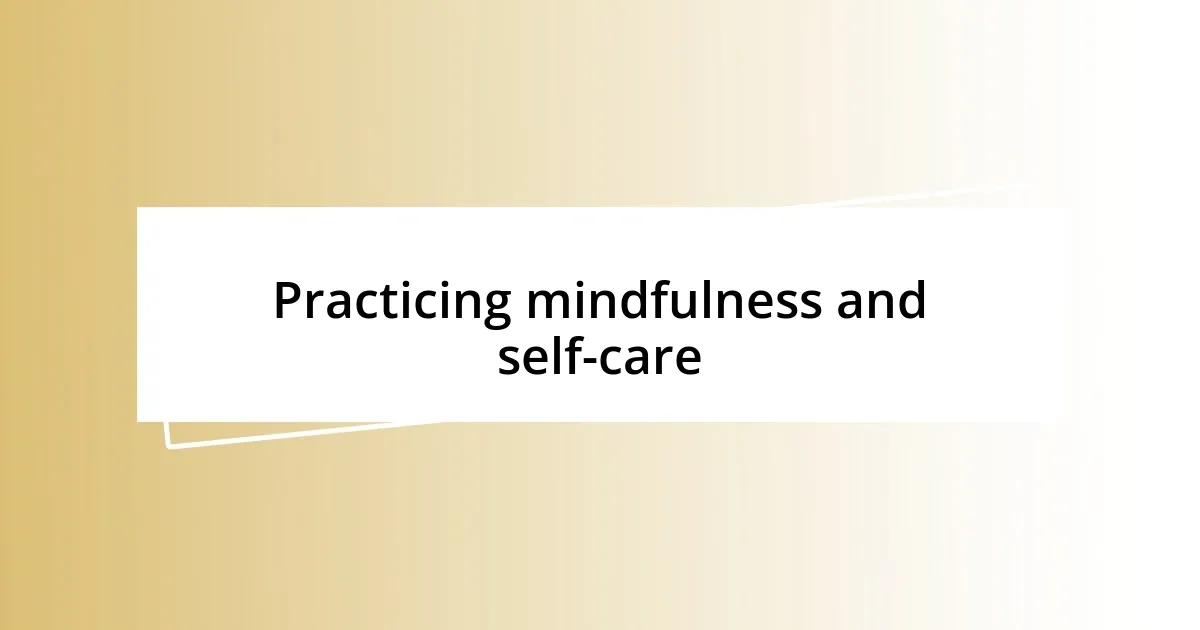
Practicing mindfulness and self-care
Practicing mindfulness and self-care has become a lifeline for me, especially during challenging times. I vividly recall a weekend retreat focused on mindfulness; it was as if a heavy blanket had been lifted from my mind. Incorporating practices like meditation and deep breathing into my daily routine allows me to navigate stress in a healthier way. Have you ever paused to just breathe and noticed how it calms the chaos? I can attest to the immediate effect it has on my mind.
Self-care looks different for everyone, but for me, it often involves setting aside time for my favorite activities, like painting or hiking. There was a pivotal moment when I decided to disconnect from social media for a week; I was astounded at how much more present I felt. Being in nature with just my thoughts and the sounds of the forest reset my mental state in a way I hadn’t anticipated. I think it’s important to find those personal rituals that truly nourish us. What rituals have helped you maintain your mental health?
I’ve learned that mastering mindfulness doesn’t mean eliminating negative thoughts; it’s about acknowledging them and creating space for oneself. One evening, while journaling, I discovered the power of reflection. Writing down my feelings helped me reveal underlying issues I hadn’t even recognized. By embracing both mindfulness and regular self-care, it feels like I am actively participating in my mental wellness journey. And honestly, isn’t that empowering?
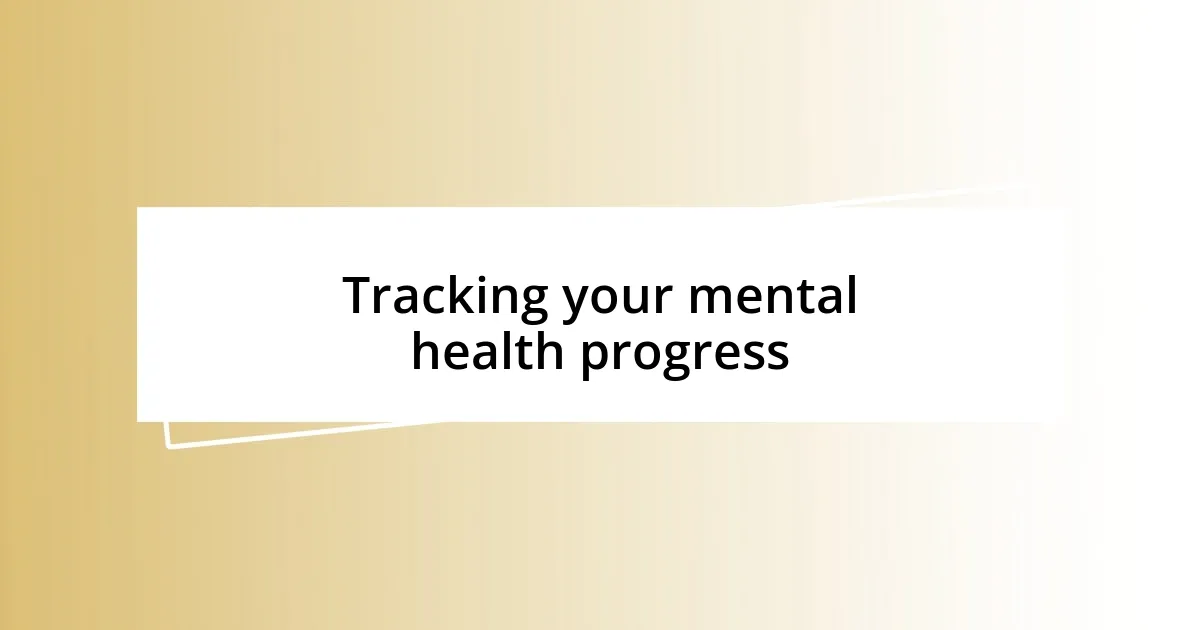
Tracking your mental health progress
Tracking your mental health progress is something I find essential to my well-being. I remember starting a journal where I simply noted my mood each day, alongside any significant events. It was enlightening to see patterns emerge; on days I exercised, my mood lifted, while stress at work led to feelings of anxiety. Have you ever tracked your emotions like this? It can reveal so much about what truly influences your mental state.
In addition to journaling, I’ve explored mental health apps that help monitor my thoughts and feelings. For instance, using a mood tracker app became a game-changer for me. With just a few taps, I could log how I felt throughout the day, making it easier to identify triggers. That immediate feedback allowed me to adjust my activities or coping strategies more effectively. When was the last time you took a moment to check in with yourself like this?
I also lean into simple checklists for my emotional well-being that encompass daily rituals or habits that support me. I’ve found that including items like “spent time with friends” or “practiced gratitude” helps me bring awareness and intention into my life. It’s fascinating how such small checkpoints can enrich my routine, reminding me to celebrate even the tiniest moments. What simple actions have you discovered that can keep your mental health in check?









